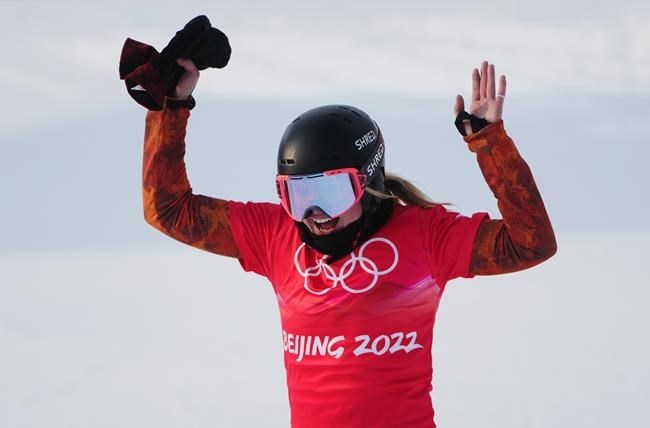BEIJING — A concussion robbed Meryeta O'Dine of her first chance at Olympic glory.
O'Dine had made Canada's snowboard team for the 2018 Pyeongchang Olympics after a successful 2017-18 campaign on the World Cup snowboard cross circuit. But an injury suffered in training two days before her event knocked her out of the Games.
On Wednesday, the 24-year-old from Prince George, B.C. was one of two Olympic rookies to climb the podium for Canada as she captured bronze in the women's snowboard cross.
She was joined by speedskater Steven Dubois, who battled his way to a photo-finish silver medal in packed, 10-man field in the men's 1,500-metre short-track event.
O'Dine's medal comes after four years of adversity. In addition to her concussion in 2018, she suffered a compression fracture in her spine from a crash that ended her 2019 season early. In 2020, she lost her brother Brandon to cancer.
"Coming out of the other side I've found a really great system and community that works for me," she said. "My friends and my family have been just absolutely nothing but supportive of me and my mission."
With American veteran Lindsey Jacobellis riding hard to the line for her first Olympic title in her fifth Games, O'Dine found herself third for the entire race, trying to reel in France's Chloe Trespeuch while fighting off a challenge from Australia's Belle Brockhoff.Â
O'Dine was able to hold off Brockhoff and pick up Canada's third snowboard medal of the Games.
"You have to play it patient and really line it up in places that you know that you're going to pass and there are some places that I tried to run out a pass and there ended up being either no space or I slowed myself down," O'Dine said of the tightly contested final.
Tess Critchlow of Big White, B.C., was sixth after finishing second in the small final.
Dubois also had a bumpy ride to his 1,500 final. The 24-year-old from Terrebonne, Que. came into the race as the lesser known of the three Canadian athletes in the field that included decorated veteran Charles Hamelin.
Dubois crashed in his semifinal, but advanced to the A final when 2018 silver medallist Sjinkie Kneght of the Netherlands was penalized.
He began the medal round at the back but climbed into second and stayed there, battling to hold off Russia's Semion Elistratov in the final laps and kicking his blade forward at the finish.
Hwang Daeheon of South Korea won the gold medal.
"I have been training for the 500 for the whole year, so the 1,500 is not my distance for sure. But I have been having good results for the past three, four years in this distance.," Dubois said of his silver medal.Â
"I knew that if I was smart in the race, use my legs and don't make bad choices I could be there. That's what I did. I did one pass, I guess two, but one big pass. And that's all what it took to get a medal."
Like O'Dine, Dubois was making his Olympic debut after being named a reserve for the 2018 team.
In curling action, 2006 Olympic champion Brad Gushue began the tournament in good form with a win over Denmark's Mikkel Krause in the opening match of the men's competition. Gushue, Nichols, Brett Gallant and Geoff Walker opened round-robin play in the evening with a 10-5 victory.
After giving up an early deuce in the opening session, Gushue took hammer in the third and made a draw for three.Â
Krause, who won a world junior title in 2009, missed a raised-double attempt in the sixth end that gave Canada a steal of two. The teams shook hands after Canada scored three in the eighth.
"Quite happy with the performance to be honest," Gushue said. "A little bit nervous starting out and getting your feet wet out there. I thought we did pretty good."
The top four teams in each draw will advance to the semifinals next week. Winners will play for gold and losing teams will meet for bronze.
Earlier, freestyle skier Evan McEachran of Oakville, Ont., looked like a good bet for the podium in the Olympic debut of men's big air after a big first run, but ended up finishing ninth.
McEachran led through much of the first run after scoring 93.00 — tied for the second-highest scoring trick in the competition — after landing an impressive switch triple cork. That score held until eventual gold medallist Birk Ruud of Norway scored 95.75 on the final jump of the first round.
McEachran went big on his second trick with an 1800 and had plenty of amplitude, but lost control and fell on the landing.Â
On his final jump, another triple cork, he crashed upon landing putting him out of the medals.
"I had a pretty big mental block, honestly, on both those tricks I did today," McEachran said. "I'm just happy I was able to go out there and give it a go a couple of times and land on my feet and not get injured. Â
"Unfortunately, it was an inches game. I think if I put down that second one and hadn't fallen over, could’ve ended up on the podium. So it's a tough pill to swallow."
Ruud had the gold medal sewn up before he took his final jump after scoring 187.75 points over his first two jumps.Â
Colby Stevenson of the United States took silver with 183.00 points, and Sweden's Henrik Harlaut earned bronze with 181.00.
In other snowboard action, Canadians Elizabeth Hosking of Longueuil, Que., and Calgary's Brooke D'Hondt qualified ninth and 10th, respectively, for the halfpipe final.
In alpine skiing, Erin Mielzynski was the top Canadian in the women's slalom, finishing 16th. Laurence St-Germain of Saint-Ferréol-les-Neiges, Que., was one spot back of her teammate.
This report by The Canadian Press was first published Feb. 9, 2022.
The Canadian Press

